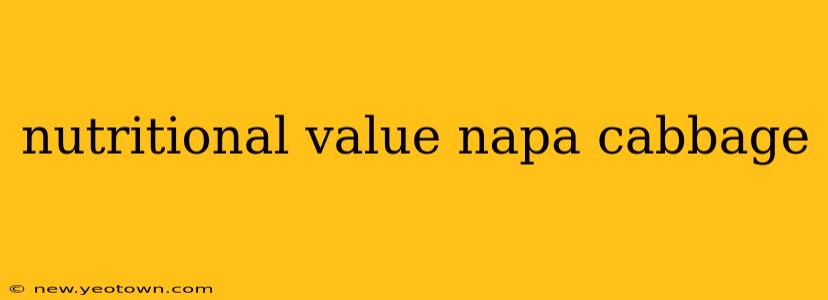Napa cabbage, also known as Chinese cabbage or celery cabbage, is a versatile and delicious cruciferous vegetable that's packed with nutrients. Its crisp texture and slightly sweet flavor make it a welcome addition to countless dishes, from stir-fries and salads to kimchi and slaws. But beyond its culinary appeal lies a wealth of nutritional benefits that often go unnoticed. Let's delve into the surprising nutritional value of this often-overlooked powerhouse.
What are the Nutritional Benefits of Napa Cabbage?
Napa cabbage is remarkably low in calories but high in essential vitamins and minerals. Imagine a vegetable that's both satisfying and contributes significantly to your daily nutritional needs – that's Napa cabbage in a nutshell. It's a fantastic source of Vitamin C, a powerful antioxidant crucial for immune function and collagen production. It also boasts a good supply of Vitamin K, vital for blood clotting and bone health. Further bolstering its nutritional profile are significant amounts of Vitamin A, folate, and potassium.
Is Napa Cabbage Good for Weight Loss?
Yes, Napa cabbage's low calorie count and high fiber content make it an excellent addition to a weight-management diet. The fiber promotes satiety, keeping you feeling fuller for longer, thus reducing overall calorie intake. This helps in managing weight and preventing overeating. The abundance of water in Napa cabbage also aids in hydration, further contributing to a healthy weight.
How Many Calories are in Napa Cabbage?
One cup of chopped Napa cabbage contains approximately only 13 calories. This incredibly low calorie count makes it an ideal ingredient for those watching their weight or looking to incorporate more nutrient-dense foods into their diet. Its low-calorie, high-volume nature makes it particularly effective for feeling full without consuming many calories.
What Vitamins and Minerals are in Napa Cabbage?
Napa cabbage is a treasure trove of essential vitamins and minerals. Let's break down some key components:
- Vitamin C: A potent antioxidant, essential for immune function and collagen production.
- Vitamin K: Crucial for blood clotting and bone health.
- Vitamin A: Supports vision, immune function, and cell growth.
- Folate: Important for cell growth and development, particularly crucial during pregnancy.
- Potassium: Helps regulate blood pressure and fluid balance.
- Fiber: Promotes digestive health and keeps you feeling full.
Beyond these, Napa cabbage also contains smaller amounts of other essential vitamins and minerals, contributing to its overall nutritional prowess.
Is Napa Cabbage a Good Source of Fiber?
Absolutely! Napa cabbage is a respectable source of dietary fiber, a crucial component for a healthy digestive system. Fiber aids in regularity, preventing constipation and promoting a healthy gut microbiome. The fiber in Napa cabbage also contributes to its satiety-promoting effects, aiding in weight management.
What are the Health Benefits of Eating Napa Cabbage?
The nutritional richness of Napa cabbage translates to a range of potential health benefits:
- Improved Immune Function: The high Vitamin C content strengthens the immune system, making you less susceptible to illness.
- Enhanced Digestive Health: The fiber content promotes healthy digestion and prevents constipation.
- Blood Pressure Regulation: The potassium content helps regulate blood pressure, contributing to cardiovascular health.
- Bone Health Support: The Vitamin K plays a critical role in bone health and blood clotting.
- Antioxidant Protection: The vitamins and minerals act as antioxidants, protecting cells from damage caused by free radicals.
Napa cabbage isn't just a delicious addition to your meals; it's a smart choice for boosting your overall health and well-being. Its versatility in the kitchen makes it easy to incorporate into a variety of dishes, ensuring you reap its nutritional rewards regularly. So, next time you're at the grocery store, remember the nutritional powerhouse hiding in plain sight – Napa cabbage.

